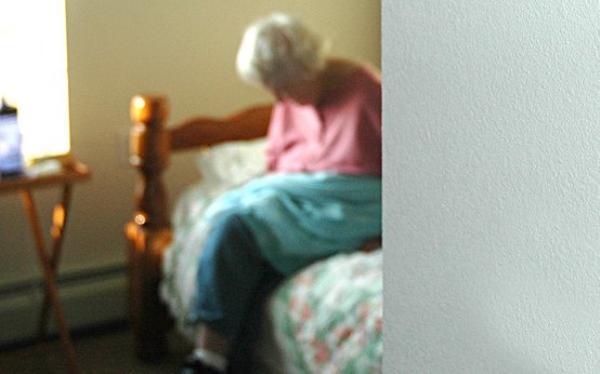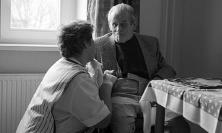The findings released this week about the provision of care and support for elderly people in their own homes have highlighted incidents of neglect and bad practice. How can we as a society make a reality of Care in the Community? Joe Egerton argues that understanding the approach of Enoch Powell, who made Care in the Community a centrepiece of his policy as Minister of Health, could help us to meet the challenge of providing proper care for a growing elderly population.
On Monday 20 June, the Equality and Human Rights Commission (EHCR) released the interim findings of their report on the provision of home-based care for people over the age of 65. Sally (Baroness) Greengross, a member of the Commission, warned that there were some very substantial problems in the delivery of care in the community, with some elderly people being neglected. ‘Care in the Community’ was one of two great reforms initiated by Enoch Powell[1] as Minister of Health between 1960 and 1963; the other was the launch of a major hospital building programme. What has gone wrong? How can we make Care in the Community succeed?
The challenge
The world has changed in fifty years. When Enoch Powell launched his Care in the Community strategy, his main concern was with the mentally ill. He ordered the closure and demolition of old asylums because health care – in particular drugs – had advanced to a point where it was no longer necessary to incarcerate the majority of people suffering from mental illness. Mental illness was at the time the main chronic condition that demanded NHS treatment. Today, many diseases that were killers a century ago are curable. We now have an ageing population and many of our elderly people cannot manage on their own. For exactly the same reason that Powell regarded the old asylums as an abomination, we reject the option of placing people in care unless that is essential, rightly preferring to give them the support they need to live in their own homes.
This gives rise to a number of challenges. Care in the Community requires carers in the community. It is not today, and never was, ‘the cheap option’. Powell knew that, and he obtained the agreement of the Treasury and the Cabinet to fund the necessary programme. However, Care in the Community requires more than just money. It demands dedication, service and often self-sacrifice by carers. But it also calls for something else – an active commitment by families and communities to their elderly members.
Delivery of care in the community
One of the problems that have emerged from the EHCR’s inquiry so far (the full report is due for release in November 2011) is that there are cases of neglect. Some elderly people are being left alone in bed for many hours, perhaps in filth, and in other cases carers have had so little time that elderly people have had to make a choice between being washed and having a hot meal. Clearly, some carers are expected to look after more people than they can manage. Other problems – for example elderly people being undressed in front of windows or other people in the home – suggest bad practice. The Commission has not yet published research showing how widespread the problems are and the coverage of the story emphasised, as did Sally Greengross, that there are many cases where elderly people are well cared for and enabled to live in dignity in their own homes and are deeply grateful for this.
A government minister stated firmly that the government believed that it had provided adequate resources to fund Care in the Community, increasing the grants to local authorities in the current year despite the need to make cuts overall. On the other hand, the BBC reported suggestions that the social services budgets of local authorities might have been cut by over £1billion. Clearly there must be rigorous inquiry to determine whether total funding is sufficient to provide an adequate number of employed carers without demanding of them a sacrifice of leisure time that would be unjust and unfair.
So while we may conclude that the overall policy is the right one, it is also clear that there are failures that are not to be excused and must be remedied.
Powell’s understanding of ‘community’
As already observed, Enoch Powell had obtained the agreement of the Treasury to fund Care in the Community. An important part of Powell’s philosophy was that decisions over spending in the community should be made by local authorities. He was in a Tory tradition that goes back before Disraeli that emphasised the importance of local government and local institutions. One of the sources of this tradition is the sixteenth century Jesuit, Robert Parsons, who in The Memorial on the Perfect Reformation of England proposed to fill the gap in welfare provision created by the dissolution of the monasteries (an essential feature of which was local provision and local control[2]) by funding the dioceses. The essential virtue for a Bishop was, according to Parsons, liberality, which Aristotle and St Thomas Aquinas both insisted involved discrimination between worthy and unworthy handing out of money. At the time of Powell’s reforms, the then Prime Minister, Harold Macmillan, the Party Chairman, Iain Macleod, and Enoch Powell all recognised this distinction – Macmillan and Macleod have been accused of supporting profligacy; Powell of miserliness. This is a caricature of three individuals at the heart of a policy. All of them shared a position first, it seems, enunciated in a specifically English context by Robert Parsons and then re-stated by Disraeli: that the institutions that provided care needed to be local and that those deciding on the distribution of always scarce resources needed to act with liberality – that is generosity to those in need and firmness to those not in need. An implication for us is that the focus of inquiry must be at the local level.
A second dimension of Powell’s thinking about the NHS and welfare in general – one he shared with Iain Macleod who had been Minister of Health from 1952 to 1955 – was the importance of enabling volunteers to involve themselves. A criticism of Aneurin Bevan’s great achievement of building a health service which provided free treatment for all – an approach which both Powell and Macleod strongly supported throughout their lives – was that it had unduly limited the scope for volunteers. This remains an issue and today Maurice (Lord) Glasman is a very influential advocate on the Labour benches of correcting what he argues was an error made in 1945 of overemphasis on what the state should do and a neglect of what individuals and small groups should contribute. This thinking has its origin in Aquinas.[3]
Families and communities
A distinctive feature of Enoch Powell’s approach was his emphasis on the family. In 1950, some newly elected Conservative MPs collaborated to produce a pamphlet on welfare reform. They gave themselves the name One Nation and continued to meet regularly as a dining club. The pamphlet was heavily influenced by Powell. Contrary to later myth, the One Nation group was strongly opposed to profligacy and put forward proposals for trimming the welfare budget. This was to fund spending on education and housing, which they judged to be the priorities.
Powell’s commitment to the family came out in what he wrote on the Labour government’s failure to clear the slums: ‘These conditions touch on many aspects of our national life:…education retarded when children have no room in which to do homework, or arrive tired at school after sleeping in a room with several others; marriages broken up through the strain of sharing a home…. A home of the right size and in the right place and at the right rent is everybody’s first need.’[4] Powell’s solution – the right one in 1950 – was to build homes and that, he observed rightly, required the state to remove licences and other constraints on building. Unlike today’s politicians, the One Nation group was willing to contemplate measures that would cause house prices to fall.
The other aspect that must have influenced Powell was the much greater social cohesion of the late 1950s and early 1960s. In small villages today there is a level of support that one does not find in towns and cities – unless the village community has been displaced by weekend commuters and the village divided between the wealthy city workers and poorer local workers. A legacy of the war was undoubtedly greater social cohesion and Powell could rely on this. Local authorities and electoral wards were also smaller, so councillors and social care workers could cooperate more easily. Much of this has been destroyed and until it is restored there will be continuing problems in delivering care in the community.
The sense of family was also far stronger in the 1950s and 1960s than it is today. How often does one hear ‘you do not look after your old people’ from those who come from other countries where several generations still live together. Can much be done? One does not know, but it is safe to assume that when Enoch Powell introduced his great reform, he could have expected more of families and local communities than we see today.
The Church and welfare
One of the institutions that Powell saw as binding the country together was the Church. Like other One Nation Tories, notably Disraeli and F E Smith (later Lord Birkenhead), he had a clear sense of identity between Church and nation – as indeed did Robert Parsons, whose ambition was not the creation of a separate Catholic Church but a strengthened English Church restored to communion with Rome.
Among Powell’s regular targets were those clergymen who preached a social gospel, mainly concerned with what politicians should do. His friend Frank Field was to tell Powell’s biographer, ‘the mission of the Church was not his concern at all’.[5] It would be easy to jump from this to an assumption that Powell thought that God had nothing to do with welfare. This would be a bad mistake. Simon Heffer reports finding an unpublished essay, dating it seems to the 1950s, where Powell lamented the ‘absurdity’ that the Tory party had had nothing to say about the Church for decades. He then went on to write: ‘It may appear an unpractical assertion, but it is an arresting and undeniable one, that if everyone were a full member of the Church, the class war and that mutual envy and fear which is socialism would be instantly inconceivable.’[6] Such sentiments are earlier to be found in an argument for maintaining an established Church put forward before the First World War by F E Smith. This is very much an underlying message of Disraeli’s novel, Sybil or the Two Nations, and the rationale of Tancred or the New Crusade. A very similar belief clearly underpins Robert Parsons’ Memorial and the importance he gives to religion in The Conference on the Next Succession. Enoch Powell was in good company in believing that a shared Christian faith would obliterate a number of social ills.
What we learn from Powell
Powell’s vision of care in the community involved more than liberality in funding the help and support required by those unable to varying degrees to look after themselves in their own homes. His vision pre-supposed certain moral values. It expected that those able to give time would do so – as St Thomas Aquinas and Aristotle both observed, one does not need to be wealthy to display liberality. He believed in the natural ability of individuals to live as cohesive families. Enoch Powell had recognised something important about faith – especially the Christian faith – and its effect in creating harmonious communities, right up to the level of the nation state.
Clearly we as active citizens should press for local authorities to sort out the provision of paid carers. We should at the same time reject any suggestion that volunteers should not supplement that provision, perhaps in many cases being the main source of provision. We should look to the House of Commons to investigate the total level of central support to local authorities and its distribution.
Even if all this is done, a vision of care in the community will still fail unless it is not supported by a communal ethic based on the virtues that direct our choices and a continuing proclamation of the message that we are charged by Christ himself to announce and to show by our works. As Cardinal Keith O’Brien spelt out in his Easter and Pentecost homilies in 2009, the Christian faith not only sustains personal virtues but in that very act also provides a basis for rebuilding our society. The Equality and Human Rights Commission may be reluctant to emphasise the importance of faith; but it will fail to achieve lasting change unless it recognises that there is a spiritual and ethical dimension to the problem it is rightly addressing.
Joe Egerton is a management consultant specialising in financial services and co-founder of Ignacity.
[1] On 20 April 1968, in a room in the Midland Hotel in Birmingham, Enoch Powell delivered what may be the best known – or at least most infamous – speech since Churchill rallied the nation against Hitler. The speech ended with the words ‘As I look ahead I am filled with foreboding. Like the Roman, I seem to see “the river Tiber foaming with much blood.”’ The speech was condemned by William Rees-Mogg in the Times editorial as ‘disgraceful’ because it was ‘calculated to inflame hatred between the races.’ Powell was promptly sacked from the Shadow Cabinet.
Any discussion of anything Enoch Powell did requires us first to address the impact of this one speech. It has led many to accuse Enoch Powell of being a racist. This is vehemently denied by those who knew him well - including that exemplar of liberal Conservatism, Ian Gilmour, whose verdict was ‘Powell was not a racist, yet he had made a racialist speech. He was an honourable man, yet he had behaved dishonourably to his colleagues.’ (Ian Gilmour and Mark Garnett. Whatever Happened to the Tories - The Conservative Party Since 1945 [Fourth Estate, 1997] p. 236)
The evidence that Enoch Powell abominated racism is very strong. As a young officer in India he had refused to stay in a hotel that would not allow an Indian officer to have a room. In 1959, in a speech many regard as the greatest made in the Commons since the War, he had condemned the atrocious conduct at Hola in unambiguous terms.
Powell was never one to admit to mistakes. But in a conversation with his oldest friend, he came close to admitting that the Rivers of Blood speech had been a mistake (Heffer, Like the Roman, p. 874). Powell never regarded himself as a racist, and it is clear that he had convinced himself, if not others, that he was combining a statement of agreed Conservative policy with a call to wake up to what he, as a West Midlands MP, knew to be a serious problem. As Gilmour observed, other politicians, with the exception of Churchill ‘had been consistently and lamentably short sighted over immigration. They had allowed it to take place without the British people feeling they had been consulted, and the failure of politicians of all parties [including Powell] to respond to popular fears and resentment had done much to diminish public faith in British institutions.’ (Gilmour and Garnett Whatever happened to the Tories, p. 235). After Gordon Brown’s hapless encounter at Rochdale, one may feel much the same can be said today.
When Powell died in 1998, the chairman of the Association of Black Clergy issued a statement: ‘Powell was not a single-subject person and served his country well. Each person stands before God as an equal and deserves the same level of love.’
Professor Philip (Lord) Norton has recently given an assessment of Enoch Powell in one of the Speaker’s lectures to mark the centenary of the 1911 Parliament Act - this is available on the BBC iPlayer, at http://www.bbc.co.uk/iplayer/episode/b0122hdn/1911_Centenary_Lecture_Enoch_Powell/.
[2] Disraeli, Sybil, Book II, chapter V.
[3] As Alasdair Macintyre has observed, if we want an exposition of the ethical and philosophical arguments underpinning the proposition that communities have a duty to care for those who cannot look after themselves, and of the virtues that are required to make a success of such a community, we have to turn to the discussion of misericordia in the Summa Theologiae - no philosopher after St Thomas has provided an extended account until MacIntyre himself in his Dependent Rational Animals: Why Human Beings Need the Virtues (The Paul Carus Lectures), Fourth Estate 2001.
[4] Quoted in Heffer Like the Roman,p. 156.
[5] Heffer Like the Roman,p. 136.
[6] Heffer, Like the Roman p. 134.
![]() ‘Ikigai: creating a space for the spiritual in social care’ by Angela Kitching on Thinking Faith
‘Ikigai: creating a space for the spiritual in social care’ by Angela Kitching on Thinking Faith





